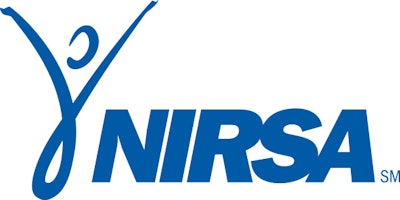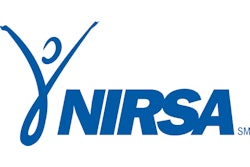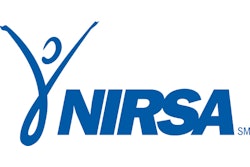
As college students begin another academic year, the campus recreation profession enters a critical juncture. Nearly three-quarters of NIRSA’s professional members joined the association after 2010, and about 40% of the 1,700 attendees at the NIRSA Annual Conference and Campus Rec & Wellness Expo in Phoenix this year were first-timers. Additionally, an increasing number of people are entering the profession in more nontraditional ways than ever before.
“Having a graduate assistantship and then getting a full-time role in campus recreation isn’t as popular anymore,” says Kayla Irlbeck, coordinator of intramural sports at California State University, Sacramento. “A lot of coordinator positions aren’t requiring master’s degrees and previous experience as much as they were pre-pandemic, so a lot of younger professionals don’t have opportunities to have mentorships.”
 Photo by Elio Hammersmith courtesy of DePaul University
Photo by Elio Hammersmith courtesy of DePaul University
To help newcomers to the profession establish a solid knowledge base of key campus recreation components, NIRSA this summer debuted “Recreation 101”— a series of four virtual courses. Created to complement recent publications in NIRSA’s Campus Recreation Essentials series, the on-demand courses each feature four, hour-long modules presented by a broad roster of campus recreation professionals. They include both industry veterans and younger professionals from institutions large and small, public and private.
The first course, ‘Introduction to Collegiate Intramural Sports 101,’ went live in June, followed by ‘Introduction to Collegiate Sport Clubs 101,’ in July and ‘Introduction to Collegiate Recreation Officiating 101,’ in August. The final course, ‘Introduction to Collegiate Esports 101,’ is expected to be online by late September. Additional courses are planned, too.
“What I really love about this is the range of instructors,” says Irlbeck, who is approaching her one-year anniversary as a campus rec professional, and one of five instructors for the intramurals course. “[For the intramurals course], we have a new coordinator like me, as well as people who are assistant directors or have been in the field for upwards of 10 years. We’re all qualified in slightly different ways. As someone who is younger, I’m able to speak to what this generation of students is looking for in a supervisor, which is very different than what students in the past were looking for.”
“I’ve been doing this for a while, and I’ve had the opportunity to meet other club sports folks, steal ideas and pick their brains,” adds James Alexander, assistant director of club sports for Centers LLC at DePaul University, and one of four instructors for the sport clubs course.
Alexander entered the campus recreation field in 2009, when he helped advance the club sports program at Xavier University. “I’ve taken in a lot of information, so I thought it was time for me to give back.”
 Photo by Quentin Blais courtesy of DePaul University
Photo by Quentin Blais courtesy of DePaul University
Framework for success
Offered for purchase separately — $90 for NIRSA members and $180 for nonmembers — the “Recreation 101” courses can be viewed at any time and at the participants’ own pace. Each is designed to be evergreen and will be reviewed and updated periodically to showcase current best practices, according to NIRSA staff.
Courses cover core fundamentals of each subject area. For example, the sports club course sponsored by the United States Tennis Association (USTA) teaches participants to identify how such programs are situated within campus structures, and how to effectively build and maintain relationships between campus partners. Finances and funding, licensing and national body governance are explained as means to successful program management. Information on student development, establishing roles and daily responsibilities, event planning, risk management and creating policy language is also provided.
The intramurals course, meanwhile, emphasizes how to successfully plan, organize and run intramural events and tournaments, as well as focuses on the importance of evaluating and improving intramural programs through participant feedback, data analysis and adapting to changing demographics.
“What’s really great is that we are giving so much baseline information — and not just about intramural sports,” Irlbeck says. “We talk a lot about how campus recreation fits into a college campus and what that can look like with different departments, like athletics and student affairs. You can finish the intramurals course and then can go watch the course about officiating or club sports. All of them are giving you the framework for success.”
Despite the “101” moniker, these courses aren’t just for rookies. “This is a great opportunity to help a supervisor or a director better understand some of the nuts and bolts of campus rec’s various components,” Alexander says of the educational offerings. “I think they’re going to have a lot of benefit — not only for new professionals and grad assistants, but also for experienced professionals.”
He also notes at least one big takeaway from “Recreation 101” for himself. “I now know three other people I didn’t know before whom I can reach out to with questions and ideas,” Alexander says, referring to his fellow instructors. “From that perspective alone, I’m a better professional.”





































